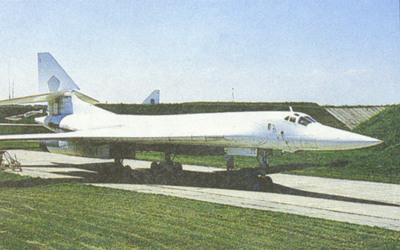
A Ukranian Tu-160 Blackjack Heavy Bomber
Background Timeline
The Spectrum Wars IV: A New Hope
1989: Berlin Wall torn down, Soviet Union dissolves. Western powers celebrate, and embark on program of disarmament. Across the world, third-world dictators begin to realize that the superpowers may no longer turn every little brushfire war into a crisis of international significance, and begin making plans.
1990: Iraq invades Kuwait on August 3, completely conquering the country in 48 hours. As the U.S. Congress debates an intervention, Saddam Hussein decides the question for them. Pausing only a week to consolidate their hold on Kuwait, Iraqi tanks smash into Saudi Arabia and the Gulf states. Despite heavy resistance from Saudi and Gulf Cooperation Council forces, by October, his forces reach the Red Sea and Oman. Western Forces, left without a safe ally to deploy troops to in the region, are powerless to stop him. A powerful naval blockade of the Persian Gulf has little effect, and naval air strikes are almost as ineffective. The only immediate result is $100-a-barrel oil prices as the Persian Gulf oil flow is cut off. Western and Asian economies crash. With Western forces fully committed in the Middle East, civil wars in Yugoslavia and Haiti run towards their inevitable conclusions: victory for the Serbs and the military junta.
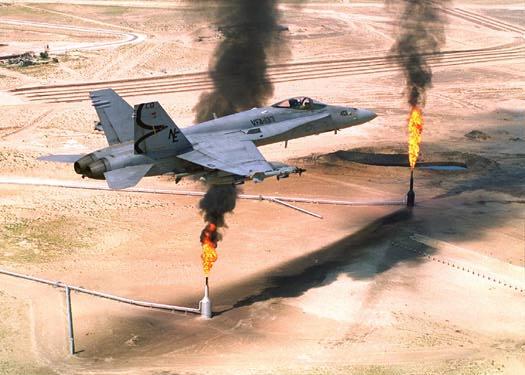
An American F/A-18 flies over a burning oil well in Saudi Arabia
1991: US Air force units deploy to Israel to intensify air strikes on Iraqi targets. This unites the Middle Eastern Islamic countries against the US and Israel. An Islamic coup in Turkey leaves only Egypt and Israel as Western-friendly powers in region. It also, incidentally, leaves Turkish Islamic forces holding a handful of ex-US nuclear weapons, which had been stored at NATO airbases in Turkey. Turkish, Iranian, Syrian, Jordanian, and Iraqi ground forces launch massive invasion of Israel. Despite plenty of warning, US/European/Israeli joint command structure proves divided and clumsy, leading to several blown opportunities. Palestinian rebel attacks on Allied troops hamper movement of reinforcements and tie down many combat troops away from the front. Israel is furious at the Western insistence on no use of extreme measures against the Palestinian insurgents. When Jerusalem falls after heavy fighting, Israel ignores Western warnings and nukes Baghdad. Saddam Hussein is dead, but horror at the loss of civilian lives leads to a Congressional over-ride of President Bush, and a forced withdrawal of US forces from the region. All European powers also withdraw forces. Despite two more Israeli nuclear strikes on tactical targets, Israel is overwhelmed by Muslim numbers and crippled by Palestinian riots at home. Israel falls to victorious Muslim forces, which continue their wartime embargo on oil exports to the West. With their numbers depleted by fighting in Israel, Egypt manages to hold the line at the Suez Canal with renewed support from the Western Powers, especially Britain. However, smaller amounts of oil still reach the West, with the tacit approval of Muslim leaders, since the restricted supply makes even the cheapest oil to drill extremely valuable on the Black Market. Meanwhile, while the fighting was going on, the Muslim revolution in Algeria has been successful.
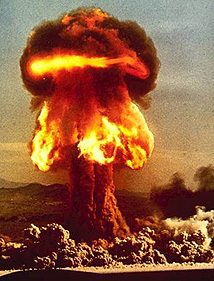
An Israeli tactical nuke used in the Negev desert
1992: Victorious Iraqi General Salah al-Din named leader of new United Islamic Republic. Begins massive purchases of weapons from Russia, which is desperate for the hard currency and secretly gleeful at the humiliation of the Western Powers. Bill Clinton elected President of United States. Democrats win sweeping control of Congress. Defense Budget cuts continue, as public faith in the military is destroyed by the disastrous Gulf War. Continued oil embargo leads to ever-worsening economic downturn. In desperation, Japan buys Siberian Oil rights for record $3 Trillion dollars, and promises extensive technology transfers to Russia to rebuild their economy. Islamic Fundamentalist rebels, funded by Algeria and the United Islamic Republic, lead successful revolutions in Mali, Mauritania, and Niger. Egypt successfully represses its own Islamic rebellion with Western help, but this only extends the oil embargo. Rioting and renewed peasant rebellions sweep Latin America as those economies hit rock bottom.
1993: Arguments over awful economic conditions in southern Europe destroy the European Union. Northern European Nations, especially Britain and Norway, with the North Sea Oil Fields, are less affected by the global depression, and form their own trading bloc modeled on the British Commonwealth. Powerful Unions in France and Italy lead street marches that force through protectionist trade legislation, and so-called "Blue Brigades" of workers harass immigrant "guest workers" from North Africa and the Middle East, leading to bloody street riots. As the tariffs rise higher, the U.S. retaliates, and the trade war only makes the depression grow worse. Unemployment and inflation lead to military coups or revolutions in several nations, notably Argentina, Peru, and Thailand. Waco Standoff in US leads to increased Right Wing and Religious dislike of the government. Recently approved NAFTA treaty is cancelled by the US Congress, led by Protectionist elements in the Senate. Unsuccessful coup attempt in Kenya leads to Ugandan invasion, which is repulsed by Tanzanian forces with some UN support.
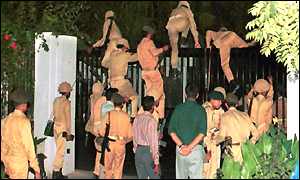
Soldiers storm the Presidential Palace in Buenos Aires
1994: Parti Quebecois wins referendum on Independence for Quebec. Canada splits into 3 parts. Quebec is briefly independent, but then successfully petitions for unification with France, which is desperate for a way to increase trade. When Quebec joins France, the Maritime Provinces ask for admission to the United States. The rest of Canada, deprived of an Atlantic coast, undergoes even worse economic conditions, and agrees to re-join the British Commonwealth. Argentine military government invades Chile, wins within a month before anyone else can intervene. Rebels backed by drug cartels win Colombian civil war, and a military coup is successful in Ethiopia. Nelson Mandela is elected president of South Africa. Jewish terrorists seeking return of Jewish rule in Israel blow up Dome of the Rock, and all remaining Jews are expelled from Israel (now Palestine) by United Islamic Republic. South Africa successfully intervenes in Mozambique civil war brought on by failed coup. Libyan and Algerian Islamic governments agree to unification, and Islamic-backed revolutions sweep West Africa.
1995: Oklahoma City Bombing in US is blamed on Right-wing American terrorists. Siberian oil production tripled, new pipeline to Vladivostok funnels almost all of this oil to Japan. Civil war in Zaire leads to intervention by Northwest African Islamic states. Fearful of growing Islamic power in Africa, an alliance is signed between Kenya, Tanzania, Egypt, and South Africa. Desperate to salvage US leadership in world Affairs, Clinton orchestrates NATO involvement in Yugoslavia to end continued ethnic cleansing by Serbs. Since an air-only campaign failed in the Mideast, Ground forces are deployed too soon, and mounting casualties lead to a humiliating withdrawal and the breakup of the NATO alliance. Bloody rebellion in East Timor prompts Australian-led intervention, and the Indonesian Government collapses. Australian forces enter Indonesia, and monitor new elections that create a reasonably democratic government.

An American APC burns in Bosnia
1996: Hotly contested US election. Christian Right Extremists blow up the Democratic National Convention in Chicago by crash-diving a cargo plane full of explosives. Militias battle government troops openly in what becomes Second Civil War. Bloody suppression of the Michigan Militia and martial law prompt southern states to secede. Many members of US military refuse to fire on rioting civilians, and join the rebels. War stretches into 1997. Russian military, humiliated by Japanese control of the increasingly lucrative Siberian oil fields, orchestrate a coup to re-install the Romanov dynasty and bring back the Czars. New Russian government re-nationalizes Siberian oil fields, and the Japanese economy crashes again. In response to new Russian strength, former Soviet Republics in Central Asia form coalition. To provide unity to this new Central Asian coalition, a Kuriltai is convened that proclaims the new Samarkand Khanate. With two powerful neighbors to the north, the Chinese military executes a bloody coup that topples the decrepit and unpopular Communist government.
1997: Threatened use of captured nuclear weapons by rebel forces leads to treaty ending Second US Civil War. America is divided, south-central portion becomes Associated States of America. Economically Desperate US government, saddled with half the territory, all the debt, and few of the oil reserves of the old USA, agrees to recognize United Islamic Republic and pay war reparations for destruction of Baghdad in exchange for lifting of oil embargo. In the waning days of US Civil war, the new Chinese government invades Vietnam over a border dispute in the oil-rich Spratly Islands. China is eventually victorious despite heavy losses. During the Siberian oil deal, the influence of the Japanese Yakuza gangsters, the Russian Mafia, and the massive amounts of government money involved led to an increasingly corrupt government. After new elections, the Yakuza is able to use fear of China and Russia to solidify their control, and restore the power of the Emperor Akihito to put an acceptable public face on their behind-the-scenes control. Japan begins rapid militarization.

Chinese APC's parade through occupied Hanoi
1998: Associated States of America, fearful of US numerical and industrial superiority, invades Mexico, and wins in lightning campaign. Northern US government threatens to intervene, but is forced to back down due to nuclear threat, and resumes serious research into SDI missile defenses. Faced with drought and famine, and convinced that the divided US will not intervene, North Korea invades South Korea. Due to military cutbacks caused by a shrinking South Korean economy, initial North Korean attacks are very successful, and Seoul falls in heavy fighting. With the ASA involved in Mexico, the USA sends some forces to aid the South Koreans. This only delays the inevitable. Unable to send significant forces due to the need to garrison the border with the ASA, US forces are trapped in a pocket near Pusan. Heavy fighting weakens both sides, and the newly enlarged Japanese army comes into play. Deploying alongside US forces, Japanese army and air force units break out of the Pusan perimeter and push north. As the year ends, Japanese/US/South Korean forces have crossed the 38th parallel and entered North Korean territory. Meanwhile, Argentine forces, finished pacifying Chile, move into Bolivia and Paraguay. Fearful of an aggressive China and a remilitarized Japan, Indonesia, Malaysia, Thailand, and Australia sign mutual defence treaty.
1999: The year begins with a bang. Two bangs, actually. First, desperate North Korean forces use a nuclear weapon to destroy American reinforcements unloading in the captured harbor of Wonsan. The US is enraged, and makes preparations to reply in kind. However, while China was perfectly willing to let the North Koreans bleed the Japanese and Americans, this has gone too far, and they realize that they can not control a nuclear-armed North Korea. Chinese forces, which had been lining up north of the Yalu to intervene in case the North Koreans were about to lose, instead invade North Korea from the north. With Chinese troops advancing rapidly, the Americans don't dare use nukes where they might anger the nuke-armed China. Luckily for the Chinese, the North Koreans only HAD one nuke. Chinese, Japanese, and Amercan forces meet and victory is declared. As fallout from the North Korean nuke starts to be felt in Japan, and with both halves of Korea devastated by the fighting, the Japanese and Chinese agree to occupy the area and take care of the reconstruction so the American forces can return home and guard the ASA border. As soon as the relieved Americans are gone, Japan annexes South Korea, and China annexes North Korea. The Americans are enraged, but impotent to do anything. Emperor Akihito releases a statement that he is enraged that the Americans "dragged" Japan into a war where Japan might get nuked again, and which did lead to the rain of radioactive fallout on Japan. The Emperor states that they will be occupying South Korea until the economy of South Korea has recovered enough to pay for the cleanup of the fallout in Japan. The SECOND bang of the year comes when India invades Pakistan following a prolonged series of border skirmishes. India makes rapid advances, but Pakistan uses a nuclear device to destroy an Indian armored spearhead. Retaliating in kind, India nukes Islamabad, Lahore, and Karachi. Pakistan manages a second strike against Amritsar, but enough Indian forces survive to complete the conquest of a devastated Pakistan. It was a pyrrhic victory, but India has conquered Pakistan and the fact that Pakistan used nukes first, but India won anyway, makes the Indian government of the Bharatiya Janatta Party VERY popular indeed. Also that year, Argentina completes the conquest of Bolivia and Paraguay. Angered at their government's inaction as Argentina swallows up their neighbors, Brazil undergoes a military coup. Late in the year, there is an abortive coup in the Philippines that leads to open civil war. Japan sends troops to "restore order", and install a corrupt puppet government.
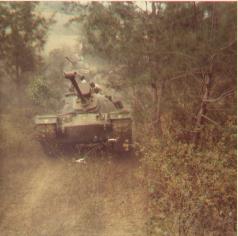
South Korean Tank retreating from the North Korean Invasion
2000: As relations between the two halves of the old USA worsen further, Argentina pushes into Ecuador and Colombia. Venezuela, knowing they are likely next on the list, and with their economy somewhat reasonable due to oil wealth, signs an alliance with Brazil. Fearful of the possibility of an Associated States attack further south, the nations of Central America ally with Argentina. Similarly, the nations of the Caribbean ally with Brazil. Europe adjusts to a new economic order, with two competing trade blocs developing: one centered on Britain, Germany, and Scandinavia; and the other centered on Spain, France, Greece, and Italy. A furious and ongoing trade war re-awakens long-dead nationalist hatreds between the French and Spanish on one side, and the Germans and English on the other. Learning from their example, and fearful of resurgent Russian nationalism under Czar Mikhail I, the nations of Eastern Europe form their own trade bloc and mutual defense pact. The North African Muslims extend their hold into Central Africa, and the East African Alliance scrambles to include as many nations as possible before the Muslim Fundamentalists control all of Africa. The Indian government, anxious to maintain their popularity as the economic effects of nuclear war and fallout begin to erode their support, invade Sri Lanka, Bangladesh, and Burma. After China grabs Laos and Cambodia, and starts to make moves to attack Taiwan, the Taiwanese appeal to Amerca for help. After the disastrous Korean Campaign, America refuses. Desperate, Taiwan asks for Japanese protection. Japan dutifully sends troops…and promptly conquers Taiwan in a lightning sneak attack from within, enraging China and threatening to break the truce line in Occupied Korea.
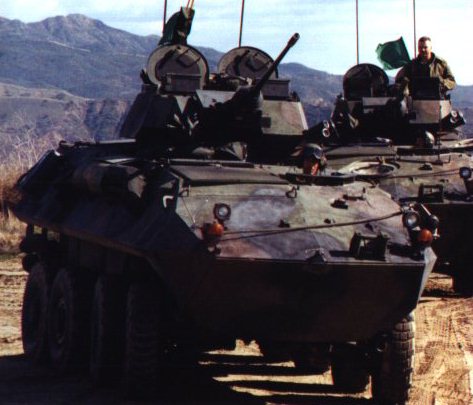
Indian APC's in the mountains of Burma
January 1, 2001: The World is divided into 16 large power blocs. Some are single nations, some are local alliance blocs with centralized military command and foreign policy. Some are superpowers with a global reach, some are resource-rich but militarily and economically weak developing nations. The Great Depression of the 1990's is over, and there is a chance for world peace. However, world peace will only come through world conquest by one nation or alliance of nations. The Game is about to begin....



